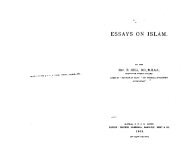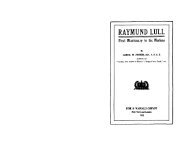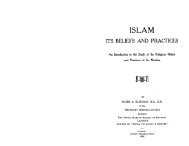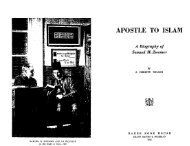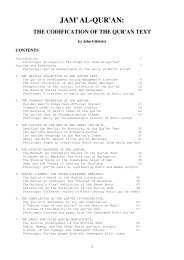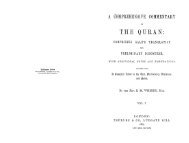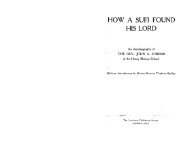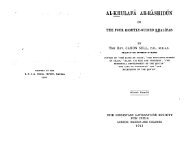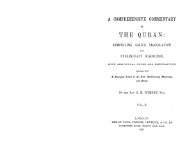Guillaume--Life of Muhammad.pdf - Radical Truth
Guillaume--Life of Muhammad.pdf - Radical Truth
Guillaume--Life of Muhammad.pdf - Radical Truth
You also want an ePaper? Increase the reach of your titles
YUMPU automatically turns print PDFs into web optimized ePapers that Google loves.
28 The L,je af <strong>Muhammad</strong><br />
i.e. so that their status should remain unaltered because <strong>of</strong> God's good<br />
purpose tawards them if they would receive it (42).<br />
38 'Abdullah b. Abu Bakr via 'Amra daughter <strong>of</strong> 'Abdu'l-Ral].miin b.<br />
Sa'd b. Zuriira told me that 'A'isha said: 'I saw the leader <strong>of</strong> the elephant<br />
and its groom walking about Mecca blind and crippled begging for food."<br />
39<br />
REFERENCES IN POETRY TO THE STORY OF THE<br />
ELEPHANT<br />
When God turned back the Abyssinians from Mecca and executed His<br />
vengeance upon them, the Arabs held the Quraysh in great honour, saying,<br />
'They are the people <strong>of</strong> God: God fought for them and thwarted the<br />
attack <strong>of</strong> their enemies.' On this theme they composed many poems.<br />
Thus 'Abdullah b. al-Zibra'rii b. 'Adiy b. Qays b. 'Adiy b. Sa'd b. Sahm b.<br />
'Amr b. Hu~an b. Ka'b b. Lu'ayy b. Ghiilib b. Fihr said:<br />
Withdraw from the vale <strong>of</strong> Mecca for<br />
From <strong>of</strong> old its sanctuary has not been violated.<br />
When it was sanctified, Sirius had not been created.<br />
No mighty man has ever attacked it.<br />
Ask the commander <strong>of</strong> the Abyssinians' what he saw.<br />
He who knows what happened will tell the ignorant.<br />
Sixty thousand men returned not home,<br />
Nor did their sick recover after their return.<br />
'Ad and Jurhum were (in Mecca) before them.<br />
God has set it above all creatures.<br />
The words 'nor did their sick recover after their return' refer to Abraha<br />
whom they carried with them when he was smitten, until he died in San'.'.<br />
Abu Qays b. al-Aslat al-An~iiri al-Kha(mi, $ayfi by name (43) said:<br />
His work it was on the day <strong>of</strong> the Abyssinian elephant.<br />
Whenever they urged it forward it held its ground,<br />
(They drove) their hooks beneath its flanks,<br />
They split its nose and it was torn.<br />
They used a knife as a whip.<br />
When they applied it to its back it made a wound.<br />
It turned and faced the way it had come.<br />
Those there bore the burden <strong>of</strong> their injustice.<br />
this tradition. The four brothers gave this protection (ftaj) to those journeying to the<br />
several countries. "Thus for Ud! the meanings <strong>of</strong> covenant, protection, and responsibility for<br />
safety are illustt£\ted.<br />
I Azr. i. 92 reports from I,I. that envoys from the tribes went to congratulate Sayf b.<br />
Dhl1 Yuan on his restoration to kingship. He singled out Quraysh for special treatment.<br />
:& I prefer the reading bubshi (W.) to thejayshi <strong>of</strong> C.<br />
The <strong>Life</strong> af <strong>Muhammad</strong> 29<br />
God sent a wind bringing pebbles from above them<br />
And they huddled together like lambs.'<br />
Their priests urged them to endure,<br />
But they bleated like sheep (44).<br />
AbU Qays b. al-Aslat also said:<br />
Rise and pray to your Lord and stroke<br />
The comers <strong>of</strong> this temple between the mountains. 2<br />
He gave you a convincing test<br />
On the day <strong>of</strong> Abu Yaksum leader <strong>of</strong> the squadrons.<br />
His cavalry was in the plain, his infantry<br />
Upon the passes <strong>of</strong> the distant hills.<br />
When the help <strong>of</strong> the Lord <strong>of</strong> the Throne reached you,<br />
His armies repulsed them, 3 pelting them and covering them with<br />
dust.<br />
Quickly they turned tail in flight, and none 40<br />
But a few returned to his pe"ple from the army (45).'<br />
Tiilib b. Abu Tiilib b. 'Abdu I-Mu(talib said:<br />
Know you not what happened in the war <strong>of</strong> DiiJ,tiss<br />
And Abu Yaksum's army when it filled the passt<br />
But for the help <strong>of</strong> God the Sole Existent One<br />
You would have been ,!nable to save your lives (46)."<br />
Abu al-$alt b. AbU Rab!'a al-Th_qafi referring to the elephant and to the<br />
!;Ianafi religion being that <strong>of</strong> Abraham said (47):<br />
The signs <strong>of</strong> our Lord are illuminating.'<br />
None but infidels doubt them.<br />
Night and Day were created and all<br />
Is abundantly plain, its reckoning is fixed.<br />
Then the merciful Lord revealed the day<br />
By the sun whose rays are seen everywhere.<br />
He held the elephant fast in al-Mughammas until<br />
It sank to the ground as though it were hamstrung.'<br />
1 With some hesitation I read this line:falafJuhum . .. al.qaram. W. reads yalufJuhum;<br />
C. inserts no vowels to the fonn I have read as indicated. Both W. and C. read al-quzum<br />
Which means 'small bodies'. Abu Dharr (Bronnle, 21) read al-qaram, which he explained<br />
by sigJuiru'l-ghanam. The line that follows seems to require a reference to sheep here.<br />
Z The tenn akhashib refers to the mountains <strong>of</strong> Mecca.<br />
S i.e. the angels.<br />
4 Or, 'from the Abyssinians'. See n. 2, p. 28. These lines occur again in W., p. 180.<br />
5 DiJ;Us is the name <strong>of</strong> a horse. Foul play during a race led to a long and bloody feud<br />
between the tribes <strong>of</strong> 'Abs and Dhubyan. See Nicholson, L.H.A. 61--62.<br />
6 Or, 'property'.<br />
, Reading thaqibatun with C.<br />
• ltiziman, Jiibi;, l;!ayawan, Cairo, 1945./1364, vii, 198, reads wa¢i'an, hut the received<br />
text is better. lowe this explanation <strong>of</strong> ~alqa to my colleague Dr. el-Tayeb. Commentators<br />
and translators have missed the point.



